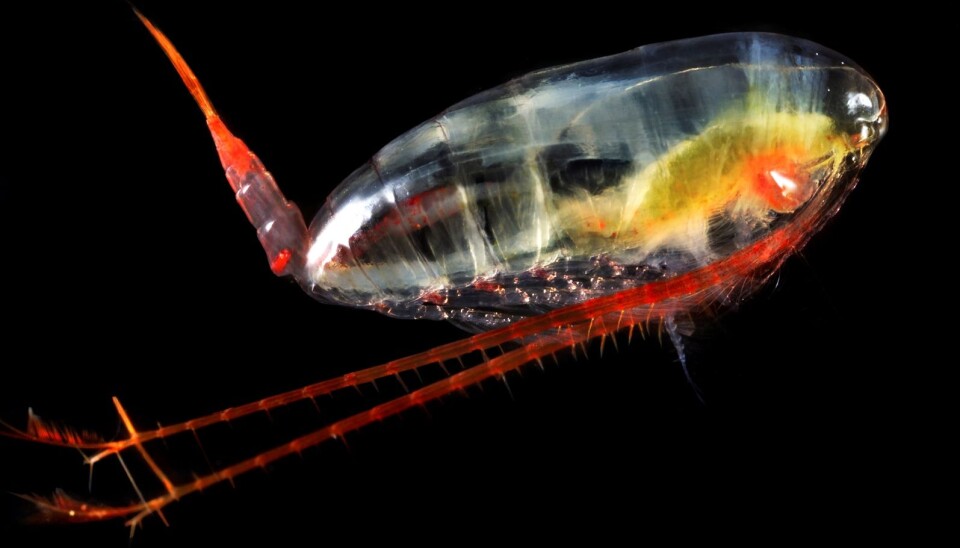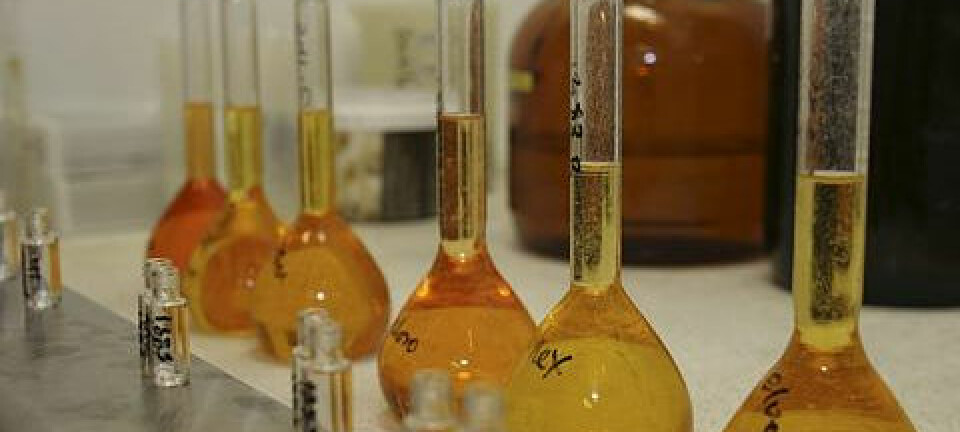An article from University of Tromsø – The Arctic University of Norway

Mice lose weight with oil
When laboratory mice on a fatty diet were given copepod oil as a dietary supplement, interesting things started to happen.
Denne artikkelen er over ti år gammel og kan inneholde utdatert informasjon.
Today, we often hear talk of dangerous stomach fat. By that they mean your waistline and the fat you have around your stomach and intestines. This kind of fat is the most harmful to our health.
Anje Höper, a Medical Biology Research Fellow at UiT - The Arctic University of Norway, gave mice that were on a fatty diet copepod oil as a dietary supplement. Calanus finmarchicus is the species of copepod from which this oil was produced, and when the mice ate this oil daily, they got thinner.
Not only was the amount of body fat reduced, but the fat cells in the mice also got smaller.
“The so-called low-grade inflammation that is characteristic of fatty tissue with large fat cells was significantly reduced, suggesting that the cells function more normally,” says Höper, who has had her research published in the British Journal of Nutrition.
Höper had 80 mice in her study and they were divided into four groups:
1. Mice that received normal mouse feed.
2. Mice that received fatty mouse feed.
3. Mice that received a small dose of copepod oil along with fatty mouse feed.
4. Mice that received fatty mouse feed but were only given copepod oil after seven weeks on the diet.
The mice stopped putting on weight so quickly
“Up to week seven, all the mice who ate the fatty feed developed fairly similarly. They weighed around 30 grams at that point, but then there was a change in the two groups that were given copepod oil,” says the researcher.
She explains that the mice stopped putting on weight so quickly. Their weight curve evened out more, while the mice that received the same diet but without the oil, continued to gain weight.
Höper weighed the mice over a period of 27 weeks and, at the end of her study, the “oil mice” weighed 42 grams, and the “fatty-diet mice” weighed 47 grams. The difference may not sound so dramatic, but in the mouse world, that is a major difference.
Höper and her colleagues also noted that the fat content in the livers of the mice that received copepod oil was lower than in those who did not get the oil – a sign of healthier animals compared with those who only ate fatty food.
Fewer lifestyle diseases
Anje Höper’s study also showed that the animals that only received fatty mouse feed had a precursor of diabetes, whereas this was much less pronounced in the mice that received copepod oil in their diet.
“What’s interesting is that the study shows that copepod oil helps those who are already overweight. The mice that were given the oil dietary supplement from the seventh week, developed similarly to those that had received the oil from the start. In fact, other researchers have previously shown that copepod oil may reduce atherosclerosis in mice with vascular disease," she says.
If all these findings can be transferred to humans, this will prove very interesting for people who are overweight.
Reduced intra-abdominal fat may be beneficial in terms of preventing diseases like diabetes, cardiovascular disease and high blood pressure.
But Höper points out that these findings are based only on preliminary studies in mice, and that we shouldn’t just take it for granted that this oil, commercially available as Calanus Oil capsules at health food stores, has been proven to be a diet pill.
Tested the oil on humans
Professor Rolf Jorde at UiT agrees. In fact, he has conducted a study with the participation of 100 subjects. Half received Calanus Oil daily for one year, while the others just got “placebo oil”. After a year had passed, it was not possible to say that those who had taken Calanus Oil had lost more stomach fat than the others.
“The subjects took a CT scan, where we measured the amount of intra-abdominal fat, and we saw no significant reduction in those who had taken the oil supplement,” says Jorde, but he is not completely negative.
“Our results were not conclusive. It may be that changes will occur after several years of consuming Calanus Oil, and we can’t say anything about whether Calanus Oil might have other positive effects, like slowing the pace of cardiovascular disease,” explains Jorde. He adds that the study could have had different results if there had been more subjects, or if it had been conducted over several years.
Rich in healthy fat
The reason why copepod oil has such a positive effect on the fat cells in mice, has not yet been conclusively determined.
According to the Institute of Marine Research, the calanus copepod contains low levels of pollutants, and is rich in healthy marine fats (polyunsaturated fatty acids like Omega-3). Höper believes they may affect how the body processes sugar and stores fat, and may lower the fat content in the blood. She adds that the oil also contains other fatty acids and antioxidants.
Additionally, the fatty acids in Calanus Oil are bound in a special way, which is different compared with other dietary supplements such as cod liver oil capsules or seal oil.
“We are planning to conduct follow-up studies, where one of the things we will be looking at is what effect this oil can have on the heart.”
































